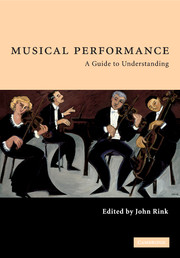7 - Preparing for performance
Published online by Cambridge University Press: 05 June 2012
Summary
Introduction
Although musical performance is an extremely public experience, the preparation for a performance usually takes place privately, and often in complete isolation. Most performances are one-off events, rarely lasting more than a couple of hours at most, but they are cultivated during days, weeks or even years of intense work. The starting point for performances of Western music is normally a score, which consists of a series of instructions of varying degrees of indeterminacy that the performer must then translate into sound. The indeterminacy inherent in Western musical notation means that the decoding of the score requires considerable interpretative input and insight from the performer. Consequently, no two performances of a work will be the same.
The term most commonly used to describe the process of preparing for a performance is of course ‘practice’ – but this can mean many things. While the psychologist might define practice as ‘learning skills through repetition’, musical practice in fact consists of a variety of different but interrelated activities including memorisation, the development of technical expertise and, ultimately, the formulation of interpretations. This chapter focuses on both the quantity and the quality of practice activities undertaken in preparing for a performance. The first section examines how much practice musicians require in order to develop their skills. The second section discusses how musicians practise effectively, looking specifically at the development of technical facility, the formulation of interpretations and the relationship between these two elements.
- Type
- Chapter
- Information
- Musical PerformanceA Guide to Understanding, pp. 102 - 112Publisher: Cambridge University PressPrint publication year: 2002
References
- 9
- Cited by

